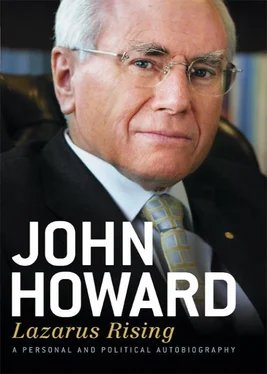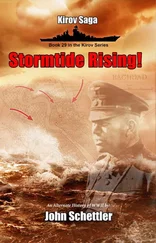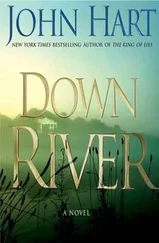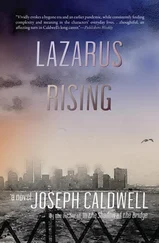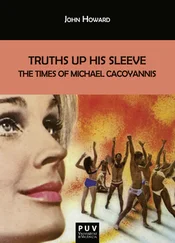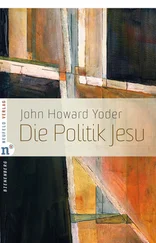In July 1977 I paid my first overseas visit as a minister and, accompanied by Janette, visited Washington, London and Ottawa. There was a shock when I returned. Fraser told me that he intended to appoint me as Minister for Special Trade Negotiations, with a specific brief to spend as much time as possible in Europe trying to extract a better trade deal for Australian exporters, particularly farmers.
Earlier, when visiting Europe, the Prime Minister had a stormy session with the European Common Market chieftains, particularly Roy Jenkins, a former British Labour Chancellor of the Exchequer, with whom Fraser had clashed in a very heated fashion. He came back convinced that the only way we would make real progress would be, effectively, to have a resident minister in Europe banging on doors the entire time.
This was a novel concept, involving the creation of a new department. I was not enthusiastic about the appointment, because Janette was several months pregnant with our second child, and I knew that I would be away for lengthy periods of time. Also, I really enjoyed the job I had. But it was a promotion, and would give an international dimension to my ministerial experience.
I assembled a small task group; it could not realistically be described as a department. Philip Flood, whom I had met only a few weeks earlier when I visited Washington, became head of the group. After receiving numerous briefings and meeting industry groups, my team and I set out for Europe in September. For the next seven weeks we traipsed around various European capitals putting our case, railing against high levels of European protection, particularly for agriculture, and not making a great deal of progress. Thirty-three years on, the essential elements of the Common Agricultural Policy, the main protective mechanism for agriculture in Europe, remain in place.
Australian and New Zealand farmers have been given a raw deal by the Europeans. By any measure, our primary producers are extremely efficient and do not receive high levels of protection from their respective governments, particularly when compared with the hefty support given to farmers in Europe, Japan and the United States.
Before I left for Europe, Phillip Lynch had brought down, in August, the second budget of the Fraser Government. For reasons I was not to know then, this budget would have a very significant impact on my political career over the following two years. Surprisingly, the budget contained significant tax cuts. I did not think that the tax cuts were necessary, nor had I thought the budget could afford them, but they would be popular.
Unfortunately, the budget had other problems: the revenue estimates on which it was put together would begin to come apart in only a few months. I learned later that there had been quite an argument between Treasury and the Department of Prime Minister and Cabinet regarding the wages growth figure: Treasury had estimated 7 per cent, the Department of Prime Minister and Cabinet had said it could be as high as 7.5 per cent. The Budget Committee of Cabinet had opted for the higher figure; it produced more revenue, thus making the tax cuts more supportable. The Treasury estimate turned out to be more accurate.
Whilst I was in Europe, speculation grew that Fraser would call an election towards the end of 1977. There was a strong case for an election before 30 June 1978, otherwise the double-dissolution election of 1975 would oblige a separate half-Senate election well before the middle of 1978. Fraser’s thinking, no doubt, was that if there were to be an early election then it was better to have it at the end of the calendar year so as to restore the more normal pattern in Australian politics. The speculation was in full swing when I returned to Australia towards the end of October.
On 27 October 1977, Fraser announced an election for 10 December. It was to be the fourth general election in five years. A rather lacklustre campaign commenced. With the benefit of hindsight, the result of the election was never really going to be in doubt. There was no way that the Australian public was going to re-elect Gough Whitlam, having so totally banished him from office just two years earlier. On the other hand, however, there was a bit of suspicion about the early election, despite the strong reasons for having simultaneous elections for the two houses, and a lack of interest in the campaign. Until late in the piece, the opinion polls were very equivocal. There was the further complication of the Australian Democrats.
Some months earlier, Don Chipp had resigned from the Liberal Party and launched the Australian Democrats. He ran as somebody seeking to occupy the centre ground of Australian politics. Chipp had been a discontented soul since Fraser excluded him from the government he formed after the 1975 election. This was a major influence in his decision to form the Democrats. Don Chipp was an engaging personality who was a traditional ‘small l’ Liberal of the Victorian mould. Our worry was that the Democrats would rip votes from the Liberal Party and, through the preferential system, too many would wind up in Labor hands.
11 ‘MAY I SPEAK TO THE TREASURER?’
Immediately after Malcolm Fraser called the 1977 election, there were unexpected and dramatic developments involving the Treasurer, Phillip Lynch, which derailed the campaign for three weeks. This was to have amazing consequences for me. The day before Fraser called the election, Peter Leake, a land developer, told a judicial inquiry in Victoria that he had been involved in local land speculation with his friend Phillip Lynch. Whitlam pursued the matter in parliament the day that Fraser called the election. The location of the investment was called Stumpy Gully, a colourful description which added to some of the drama. There were also questions raised about property Lynch had acquired. The press went ballistic.
Lynch had not done anything improper or illegal, but he had been politically indiscreet. It is never a good thing for a senior minister, particularly a Treasurer, to involve himself in anything that can be regarded as financial speculation. The country was still in the economic doldrums, and it was so easy for the Government’s opponents to allege double standards.
When the matter was raised in parliament, he had no immediate answer and, from the start, was on the defensive. Only a short time afterwards, the Treasurer became ill and, on 10 November, he entered Peninsula Private Hospital suffering severe kidney pains. It was at this point that I was caught up with the problems that had engulfed Phillip Lynch.
I was having dinner at home with my family on 10 November when Fraser rang and calmly told me that Lynch had gone into hospital and, therefore, had to stand aside as Treasurer, and that he wanted me to ‘become the Government’s spokesman on Treasury matters'. He didn’t say exactly that I was being appointed as acting Treasurer, although that was the case. Totally surprised, I relished the challenge; it would put me back in the mainstream of the political debate. But, at that stage, I did not imagine that this would be anything other than a temporary responsibility.
However, developments were to change that. Lynch went under the knife the next day, and five days later, convinced that it had an issue damaging to the Fraser Government, the ALP went for the jugular. Using parliamentary privilege, two Victorian upper-house MPs made sweeping allegations against Lynch. The issue ran strongly. The media and the Labor Party would not let it rest. They wanted the scalp of the Treasurer.
Fraser was unhappy with the explanations given by Lynch regarding his financial affairs and angry that every day was dominated by an issue which involved, at root, a bad judgement call by his deputy.
At a news conference called by Fraser and me, ostensibly to talk about Whitlam’s policy-speech highlight to abolish payroll tax, virtually every question focused on Lynch, and the news conference was a total wipe-out for the Government. Fraser walked from the conference with a stony face, and I knew that Phillip Lynch would not remain as Treasurer through to the election. Unless the Lynch issue was contained, it would overwhelm the entire election campaign.
Читать дальше
